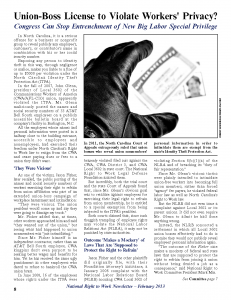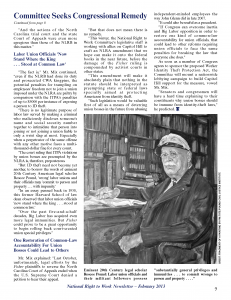Is This Any Way to Run a City’s Schools?
Leaked CTU Proposals Won’t Do Anything to Improve Schools’ Poor Performance

Congress Can Stop Entrenchment of New Big Labor Special Privilege
(Source: February 2013 National Right to Work Committee Newsletter)
In North Carolina, it is a serious offense for a business or nonprofit group to reveal publicly any employee’s, customer’s, or contributor’s name in combination with his or her social security number.
Exposing any person to identity theft in this way, through negligence or malice, makes you liable to a fine of up to $5000 per violation under the North Carolina Identity Theft Protection Act (ITPA).
In the fall of 2007, John Glenn, president of Local 3602 of the Communications Workers of America (CWA/AFL-CIO) union, apparently violated the ITPA. Mr. Glenn maliciously posted the names and social security numbers of 33 AT&T Bell South employees on a publicly accessible bulletin board at the company’s facility in Burlington, N.C.
All the employees whose names and personal information were posted in a hallway close to the building entrance, accessible to employees and nonemployees, had exercised their freedom under North Carolina’s Right to Work law to resign from the CWA and cease paying dues or fees to a union they didn’t want.
‘They Were Vicious’
As one of the victims, Jason Fisher, later recalled, the public posting of the names and social security numbers of workers exercising their right to refrain from union affiliation was part of an extended union-boss campaign of workplace harassment and intimidation:
“They were vicious. The union president would come up and say they were going to damage my truck.”
Mr. Fisher added that, at times, other workers approached him and said “they wanted out of the union,” but seeing what had happened to union nonmembers was “just intimidating.”
Since Mr. Fisher himself is an independent contractor, rather than an AT&T Bell South employee, CWA kingpins don’t even purport to be seeking better wages and benefits for him. Yet he has received the same ugly punishment as other employees who dared to refuse to bankroll the CWA union brass.
In June 2008, 16 of the employees whose rights under the ITPA were brazenly violated filed suit against the CWA, CWA District 3, and CWA Local 3602 in state court. The National Right to Work Legal Defense Foundation assisted them.
But incredibly, both the trial court and the state Court of Appeals found that, since Mr. Glenn’s obvious goal was to retaliate against employees for exercising their legal right to refrain from union membership, he is entitled to a special exemption from being subjected to the ITPA’s penalties.
Both courts claimed that, since such thuggish trampling of employee rights may violate the National Labor Relations Act (NLRA), it may not be punished by state authorities.
Outcome ‘Makes a Mockery’ of Laws That Are ‘Supposed to Protect the Right to Refrain’
Jason Fisher and the other plaintiffs did originally file, with their Foundation attorney’s assistance, a January 2008 complaint with the National Labor Relations Board (NLRB) accusing CWA Local 3602 of violating Section 8(b)(1)(a) of the NLRA and of breaching its “duty of fair representation.”
Since Mr. Glenn’s vicious tactics were plainly intended to intimidate union-free workers into becoming full union members, rather than forced “agency” fee payers, he violated federal labor law as well as North Carolina’s Right to Work law.
But the NLRB did not even issue a complaint against Local 3602 or its parent unions. It did not even require Mr. Glenn to admit he had done anything wrong.
Instead, the NLRB concocted a settlement in which all Local 3602 union bosses effectively had to do is promise they would not publicly reveal employees’ personal information again.
“The outcome of the Fisher case makes a mockery of federal and state laws that are supposed to protect the right to refrain from joining a union without being denied a job as a consequence,” said National Right to Work Committee President Mark Mix.
“And the actions of the North Carolina trial court and the state Court of Appeals were even more egregious than those of the NLRB in this matter.”
Labor Union Officials ‘Now Stand Where the King . . . Stood at Common Law’
“The fact is,” Mr. Mix continued, “even if the NLRB had done its duty and prosecuted CWA kingpins, the potential penalties for trampling on employees’ freedom not to join a union imposed under the NLRA are paltry by comparison with the ITPA’s penalties of up to $5000 per instance of exposing a person to ID theft.
“There is no legitimate purpose of labor law served by making a criminal who maliciously discloses someone’s name and social security number together to intimidate that person into joining or not joining a union liable to only a wrist slap at most. Especially when a perpetrator of the same offense with any other motive faces a multi-thousand-dollar fine for every count.
“The court ruling that ITPA violations by union bosses are preempted by the NLRA is, therefore, preposterous.
“But ID theft need not become yet another, to borrow the words of eminent 20th Century American legal scholar Roscoe Pound, ‘wrong’ labor unions and their officials may ‘commit to person and property . . . with impunity.’
“In an essay penned back in 1958, this former Harvard School of law dean observed that labor union officials ‘now stand where the king . . . stood at common law.’
“Over the past five-and-a-half decades, Big Labor has acquired even more legal immunities. But Fisher could prove to be a great opportunity to begin rolling back court-created union special privileges.”
 One Restoration of Common-Law Accountability For Union Bosses Could Lead to Others
One Restoration of Common-Law Accountability For Union Bosses Could Lead to Others
Mr. Mix explained: “Last October, unfortunately, legal efforts by the Fisher plaintiffs to reverse the North Carolina Court of Appeals ended when the U.S. Supreme Court denied a petition to hear their appeal.
“But that does not mean there is no remedy.
“This winter, the National Right to Work Committee’s legislative staff is working with allies on Capitol Hill to craft an NLRA amendment that we hope can make it onto the federal books in the near future, before the damage of the Fisher ruling is compounded by activist courts in other states.
“This amendment will make it absolutely plain that nothing in the statute should be interpreted as preempting state or federal laws specially aimed at protecting Americans from identity theft.
“Such legislation would be valuable first of all as a means of deterring union bosses in the future from abusing independent-minded employees the way John Glenn did in late 2007.
“It could also be useful as a precedent.
“If Congress can overcome inertia and Big Labor opposition in order to restore one kind of common-law accountability for union officials, that could lead to other reforms requiring union officials to face the same penalties for breaking the law that everyone else does.”
As soon as a member of Congress agrees to sponsor the proposed Worker Identity Theft Protection Act, the Committee will mount a nationwide lobbying campaign to build Capitol Hill support for the measure, vowed Mr. Mix.
“Senators and congressmen will have a hard time explaining to their constituents why union bosses should be immune from identity-theft laws,” he predicted.

Leaked CTU Proposals Won’t Do Anything to Improve Schools’ Poor Performance

Wherever Big Labor wields the power to collect forced union dues, union bosses funnel a large share of the confiscated money into efforts to elect and reelect business-bashing politicians. Employment growth tends to lag as a consequence.

Members Insist They Keep Pro-Right to Work Campaign Promises